Govt Push Paves Way For OTR Recycling In Australia
- By Gaurav Nandi
- February 28, 2025
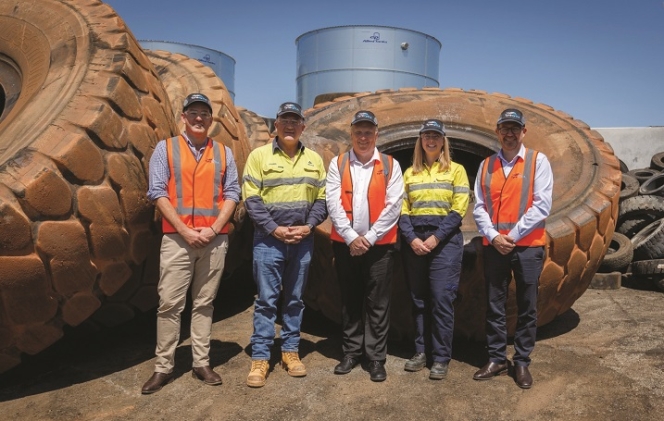
The Australian Government’s push for end-of-life tyre recycling, particularly through the use of crumb rubber in road construction, has been gaining momentum. With Western Australia and Queensland continuing to grow rapidly but key markets like Victoria falling away, challenges remain in expanding the use of crumb rubber, especially in New South Wales and South Australia. However, partnerships like that between Tyrecycle and Alcoa Australia are helping pave the way for the recycling of OTR tyres, creating new opportunities.
The Australian Government’s endeavour for recycling end-of-life (ELT) tyres has been lauded by industry experts in many mature markets. Since December 2021, Australia has prohibited the export of whole baled tyres, except for specific casings and retreads. The Australian Government emphasises a circular economy approach, which includes incentives for local manufacturing by procuring tyre-derived materials such as crumb rubber for asphalt and other civil applications. The Western Australian Government has used over 3,000 tonnes of crumb rubber for road projects in a single year.
However, challenges remain with the recycling of off-the-road (OTR) tyres, often disposed of at mining sites. Nonetheless, the proactive nature of the government, especially in Western Australia, has paved the way for OTR tyre recycling, with recyclers forming partnerships with mining companies to ensure a steady stream of supply.
One such collaboration is between Tyrecycle, the recycling arm of ResourceCo, and Alcoa Australia. Tyrecycle’s state-of-the-art recycling facility in East Rockingham, 40 kilometres south of Perth, has already welcomed its first load of used OTR tyres from Alcoa, which is a bauxite mining company.
Speaking to Tyre Trends on the current state of waste OTR tyres, Tyrecycle Chief Executive Officer Jim Fairweather stated, “Currently, an estimated 130,000 tonnes of OTR tyres are discarded annually; 50,000 tonnes in The Pilbara alone. Tyrecycle is processing about 15,000 tonnes per year and aims to expand its footprint into key mining regions like the Hunter Valley, Bowen Basin and Pilbara. These areas are pivotal to Australia’s coal and iron ore mining industries, presenting significant opportunities for waste management and resource recovery.”
He added, “Mining operators often choose the cost-effective route of burying waste tyres on-site, which hinders recycling efforts. While some companies recognise the importance of responsible waste management, regulatory enforcement is needed to make recycling a standard practice. Proactive companies in the mining sector are stepping up, recognising the reputational and environmental risks associated with poor waste management. However, broader adoption is hampered by minimal regulatory mandates.”
COLLABORATIVE MEASURES
The collaboration between Tyrecycle and Alcoa was driven by a mutual commitment to sustainable practices and innovation in waste management. For the recycler, it represented a strategic move to expand its capacity to process OTR tyres and, in the future, conveyor belts, which are significant waste streams in the mining sector. This partnership evolved over five years of discussions, trials and project planning.
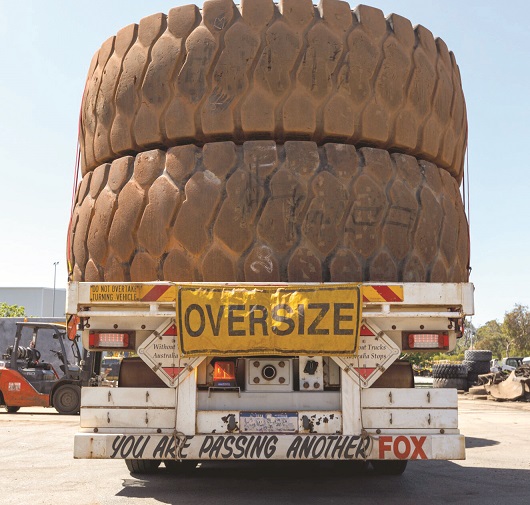 Equipped with a larger primary shredder capable of processing substantial pieces of OTR tyres, the plant in East Rockingham enabled the recycler to manage Alcoa’s tyre waste effectively. Prior trials at the recycler’s New South Wales facility ensured the material could be processed successfully, laying the groundwork for this full-scale collaboration.
Equipped with a larger primary shredder capable of processing substantial pieces of OTR tyres, the plant in East Rockingham enabled the recycler to manage Alcoa’s tyre waste effectively. Prior trials at the recycler’s New South Wales facility ensured the material could be processed successfully, laying the groundwork for this full-scale collaboration.
“Alcoa provides full OTR tyres, which are pre-processed using excavators to reduce size. These pieces are then fed into our fully automated plant, where they undergo a comprehensive process to produce crumb rubber as fine as 700 microns. The crumb rubber is repurposed into road construction material within Western Australia, creating a closed-loop system. The project aligns with the Western Australian Government’s push for the integration of rubber crumb in road infrastructure, ensuring sustainable outcomes,” said Fairweather.
He mentioned that the company has initiated partnerships with major mining operators, securing long-term offtake agreements to convert OTR tyres into value-added products for resale. While agreements are being finalised with several top-tier miners, the company aims to secure additional multi-year contracts, further cementing its position in the growing circular economy of Australia’s resource sector.
PRODUCTION
The company operates nine facilities culminating in a current processing volume of 180,000 tonnes annually with 30 percent spare capacity, allowing for up to 250,000 tonnes per year. Crumb rubber production stands at approximately 25,000 tonnes annually.
While mining tyres constitute a smaller portion of the company’s operations, the bulk of recycling comes from collecting approximately 20 million tyres annually from retail outlets across Australia, including regions such as Far North Queensland, Tasmania, Perth and the Pilbara. These include PCR, TBR, four-wheel-drive tyres, forklift tyres and even bicycle tyres. Roughly 80,000 tyres are collected daily.
Alcoa’s waste OTR tyres are entirely processed into crumb rubber for the Western Australian market. Beyond this, crumb rubber from other ELTs is sold into sectors such as the steel industry, adhesives manufacturing, playground surfacing, walking trails and civil applications. While these sectors are important, they don’t match the volumes required for road construction in Australia.
Additionally, tyre derived fuel (TDF) is manufactured in various sizes to cater to different customer needs. For example, 1.5-inch steel-free chips are used in power boilers, while 2-inch, 3-inch, 4-inch and 6-inch chips are utilised in cement kilns, both locally and for export to countries like Japan.
Offshore customers further process these materials into products like micronised rubber powder. The company also supplies feedstock to large tyre recycling businesses in India and Korea.
Commenting on whether Alcoa takes any of the tyre-derived product under the agreement, Fairweather informed, “Alcoa currently does not take any products, but there are opportunities in development, particularly in the smelting sector, where materials could be used as reductants.”
CONSUMPTION
While crumb rubber production serves local markets exclusively, TDF and steel exports continue to play a vital role in the company’s global strategy with a focus on improving quality and expanding domestic utilisation.
“The crumb rubber produced is fully consumed within Australia, reflecting a strong domestic demand for applications such as road construction. While 5,000 tonnes of TDF is consumed domestically in New South Wales, the vast majority – over 100,000 tonnes – is exported. That said, domestic consumption of TDF is poised to increase significantly with plans to redirect approximately 100,000 tonnes for use within Australia as part of ongoing pipeline development projects,” said the executive.
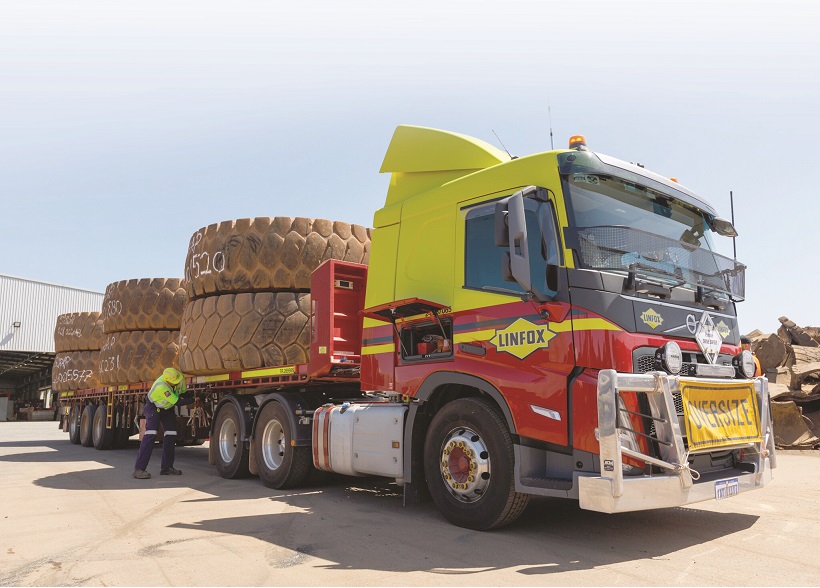
“Additionally, steel extracted from the tyres is traded globally as scrap. With the installation of steel-cleaning systems across all facilities, we now export steel with a much lower rubber contamination rate, reduced from 20 percent to 1-2 percent. This enhancement improves the value of the scrap and allows for more competitive pricing at the collection stage,” he added.
Commenting on the use of crumb rubber for roads, he said, “Road construction remains the largest consumer of crumb rubber in Australia, outpacing other uses. The Western Australian Government’s mandate to use crumb rubber in roads has been evolving over the past three years. Three years ago, there was virtually no sale of crumb rubber for road construction in Western Australia. However, today, Western Australia has become the second-largest market for crumb rubber used in roads across the country, despite having only 10–15 percent of Australia’s population.”
“The Main Roads Western Australia agency played a pivotal role by mandating crumb rubber in road specifications, significantly increasing demand. Additionally, the Western Australian Government supported this initiative by funding the creation of tyre processing infrastructure. This dual approach that includes stimulating private sector investment while ensuring procurement for recycled materials has been key to making these investments viable,” he added.
QUALITY CONTROL
Fairweather quipped that being one of the largest recyclers in the land has its perks when it comes to quality controls. With an expansive collection network that draws in tyres that are not only manufactured at home but imported from different regions ensures understanding of different chemical compositions.
As for ensuring the quality of crumb rubber, especially for road construction, he said, “We implement rigorous quality control procedures from testing the crumb rubber three times a day across all facilities to ensure that it is consistent and free of impurities. We take specific measures to ensure even sample collection and use advanced software to track and grade the rubber’s size distribution. Chemical tests are also performed periodically to maintain the integrity of the crumb rubber. Given the varied origins of the tyres, the company’s large scale allows it to homogenise these variations, ensuring a high-quality product.”
He added that quality is paramount because contaminants like metal can damage equipment used in road construction and asphalt applications. The company maintains a metal contamination level of less than 0.01 percent, which is crucial for the reliability and functionality of the crumb rubber in its applications.
Regarding the recycling of mining tyres compared to passenger and TBR tyres, he noted that there is a significant difference in the process. “Mining tyres are much larger and require different handling equipment and primary processing. These tyres need to be pre-processed to remove the bead before being reduced to a manageable size. In contrast, passenger and TBR tyres undergo a more standard shredding process, which then leads to various mechanical resizing depending on the final product,” said the executive.
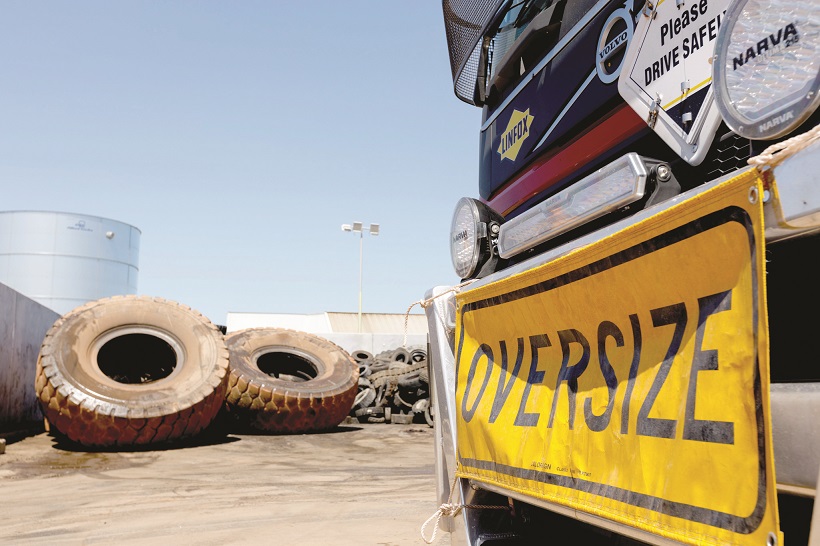
The TDF also goes through a rigorous quality control process.
MARKET FORCES
The largest market for crumb rubber in Australia has historically been Victoria, where it has been widely used in road construction. However, in recent times, Victoria’s market has faced challenges, largely due to budgetary pressures that have led to delays or cancellations of road projects. Despite this, it has remained the leader in crumb rubber consumption for roads.
Western Australia and Queensland are closely matched, coming in second for crumb rubber usage. On the other hand, New South Wales (NSW) and South Australia are behind in their adoption of crumb rubber in road construction, with NSW, particularly Sydney, significantly lagging. This presents an opportunity for growth in those regions, as they could start to increase their usage to match the other mainland states.
Tasmania, due to its smaller population and limited road construction, uses less crumb rubber, but this is proportional to the region’s size and needs.
“The collaboration with Alcoa and the potential for them to purchase products in the future is still under discussion. Both parties are open to exploring further development of this partnership. Alcoa has proven to be a strong partner, and there are good opportunities for continued collaboration, especially in creating a circular process that benefits both Alcoa and the broader market,” averred Fairweather.
The growth strategy for the company focuses on expanding its production capabilities and increasing the value-added nature of its products. This includes ongoing investment in plant infrastructure and a focus on increasing market share, particularly in tyre collection volumes.
The company sees significant potential in the OTR sector, which is currently untapped, and plans to continue developing new products and processes to offer higher-value products rather than just TDF.
TDF, however, remains an essential part of the business. It plays a crucial role in tyre recycling by reducing landfill waste and offering a more environmentally friendly alternative to fossil fuels.
Trials on imported tyres were also successfully completed with full-scale processing set to begin imminently. Tyrecycle also plans to establish processing facilities in Central Queensland and Western New South Wales, reducing logistical barriers and enhancing service capabilities.
KraussMaffei Technologies Appoints Dirk Musser As New Managing Director
- By TT News
- February 27, 2026

KraussMaffei Group is set to implement a leadership transition at its subsidiary, KraussMaffei Technologies, with a change at the board level. Jörg Stech, who has served as Chairman of the Board and global head of injection moulding, automation and additive manufacturing since 2023, will be departing on 31 March 2026 at his own request. He will be succeeded by Dirk Musser, the current Head of Group Transformation at the parent company, who has been appointed as the new Managing Director effective 1 April 2026. The leadership handover between Stech and Musser is already in progress, ensuring a seamless transition.
Stech’s tenure unfolded during a difficult economic period marked by financial losses and a contracting market. He responded with decisive measures aimed at margin enhancement and balance sheet improvement, which laid the groundwork for the company's long-term stability. Under his direction, the product lineup for injection moulding and automation was revitalised with the introduction of the LRXplus linear robot, the fully electric PX series and the MC7 control system, all launched in late 2025 alongside new artificial intelligence tools. He also launched a multi-year development initiative and pushed the company into new markets, such as aerospace and drone technology, by leveraging expertise in specialised processes like ColorForm. Through a focus on operational excellence, pricing discipline and capital efficiency, Stech guided the company to a significantly more resilient position compared to three years prior, despite the persistent downturn in injection moulding.
Musser brings to his new role extensive experience in transformation and finance. In his current capacity, he has already been closely involved with KraussMaffei Technologies, collaborating with its leadership to drive strategic initiatives and enhance operational performance. His qualifications include sharp analytical abilities, a strong grasp of industrial processes and a broad international perspective. An economist by training, Musser has accumulated over 20 years of leadership experience across various technology and industrial sectors. His background includes leading major transformation and turnaround projects at CRRC New Material Technologies, where he stabilised plant earnings in North America, as well as directing operational and financial restructurings during his time at Deloitte. He has also held roles with P&L responsibility, managing global supply chains and post-merger integrations at CRONIMET and has prior experience with automotive manufacturers including Daimler and Fujian Benz Automotive in China.
Alex Li, CEO, KraussMaffei Group, said, "Jörg Stech took on responsibility in a difficult situation, set clear priorities and launched decisive initiatives. The successful market launch of the LRXplus linear robot and the all-electric PX machine series, the consistent focus on profitability and the sustainable strengthening of our balance sheet are visible results of this work. We would like to express our sincere thanks to Jörg Stech for his leadership, integrity and team spirit. We value Dirk Musser as a leader who combines strategic clarity with operational excellence. In a short period of time, he has provided vital impetus for the transformation of the group and impresses with his analytical strength, decisiveness and deep understanding of our processes – not least through his successful collaboration with the managing directors of KraussMaffei Technologies. We are convinced that he will continue on this path with clarity and creative drive to successfully align KraussMaffei Technologies."
Stech said, "After many years in an environment full of technological, economic and geopolitical challenges, I look back with great gratitude on a time in which I was always surrounded by an exceptional workforce. Together, we achieved things that many initially thought were impossible. This cooperation, this willingness to push boundaries and create something new, was a joy for me. My special thanks go to all stakeholders in the company and, of course, to all employees. I leave with respect, gratitude and the conviction that this long-established company will continue to achieve great things in the future."
Musser said, "Together with my fellow managing directors Dr Frank Szimmat and Markus Bauer, I want to resolutely drive forward the further development of KraussMaffei Technologies. Our focus is on further expanding stability and performance and taking the necessary steps to successfully position the company in a dynamic market environment. I look forward to shaping this path together with our teams.”
Dario Marrafuschi Succeeds Mario Isola As Pirelli’s Head Of Motorsport
- By TT News
- February 27, 2026
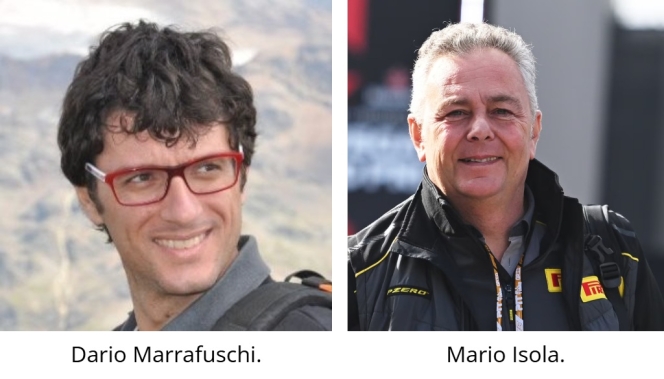
Italian tyre manufacturer Pirelli has announced that Dario Marrafuschi will become the Head of its Motorsport Business Unit, effective 1 March. He succeeds Mario Isola, who will remain with the company until 1 July to assist with the leadership transition.
Marrafuschi joined Pirelli in 2008 and has held positions within the Formula 1 Research and Development department. Most recently, he led the development of the company's road products.
He will report to Giovanni Tronchetti Provera, Executive Vice-President of Sustainability, New Mobility & Motorsport. The appointment comes as the company continues its role as the tyre supplier for various global motorsport categories.
Isola departs the company following a tenure that included the expansion of Pirelli’s motorsport operations. The company stated that Isola will pursue other professional opportunities following his departure in July.
Changing Tyre Dynamics In A Changing Car Market
- By Sharad Matade
- February 27, 2026
For Continental Tires India, the passenger vehicle market in India is entering a phase where scale and structure are finally aligning with its longstanding premium ambitions. Passenger vehicle sales reached a record 4.3 million units in 2024, expanding by 4–5 percent year on year, but it is the composition of that growth – rather than the headline volume – that is reshaping the company’s strategy. Utility vehicles now account for approximately 58 percent of total passenger vehicle sales, up sharply from about 51 percent the previous year, cementing SUVs and crossovers as the dominant force in the market.
This structural shift has direct consequences for tyre manufacturers operating at the upper end of the value spectrum. Larger vehicles bring higher kerb weights, bigger wheel diameters and greater expectations around refinement, safety and performance. For Continental, the change represents not merely an increase in addressable demand but a decisive move towards tyre categories where technology differentiation and pricing discipline can coexist.
Samir Gupta, Managing Director of Continental Tires India, calls this phase a turning point, not a temporary high. He says the surge in utility vehicles – driven by electrification and more premium cars – fundamentally changes the economics of the passenger tyre market in India.
“Let me clarify one thing first. The utility vehicle segment is no longer small. Last year, around 60 percent of passenger vehicles sold in India were utility vehicles, and including first-time buyers upgrading within this segment, the share goes beyond 65 percent,” Gupta says.

Industry data broadly supports this assessment. SUVs alone contributed close to three-fifths of all passenger vehicle sales in 2024, with compact utility vehicles accounting for a significant share of incremental volumes. The overall passenger vehicle market, at around 4.3 million units, has thus become structurally skewed towards larger formats – an inflection with long-term implications for tyre sizing, load ratings and product mix.
This shift shows in replacement demand. As vehicle footprints grow, rim diameters are increasing. “The market is clearly moving from smaller to bigger rim sizes. Demand for 17-inch and above tyres is rising sharply,” Gupta says. While these tyres are still a minority, their growth far outpaces the overall passenger tyre market.
Electrification is accelerating the shift. A substantial proportion of electric passenger vehicles sold in India today are SUVs, and Continental expects EVs to account for more than 50 percent of the passenger vehicle segment within five years. For tyre manufacturers, this creates new technical requirements – higher torque tolerance, lower rolling resistance and stringent noise control. “That creates a significant opportunity for us because our strengths lie in premium, high-performance tyres,” Gupta says.
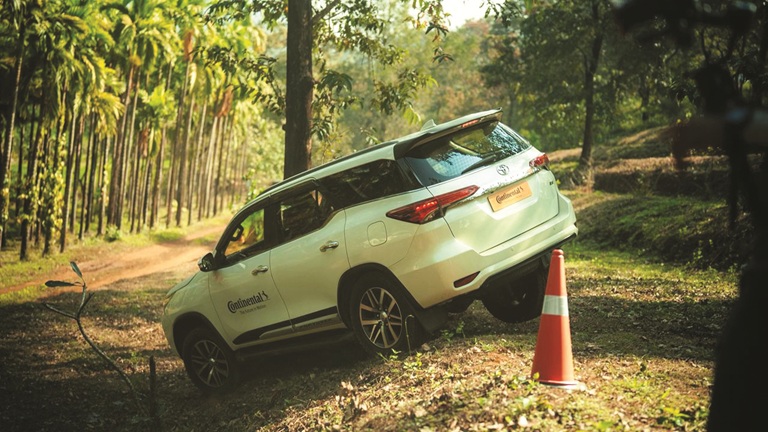
Despite these favourable structural trends, premium tyres have historically struggled to gain traction in India. For much of the past decade, the market remained intensely price-sensitive, with tyres treated largely as commoditised replacement items. Continental’s response, Gupta explains, has been consistent rather than tactical pricing. “Right from the beginning, we have focused on fair pricing. The idea is simple – if we can clearly differentiate on performance and consistently deliver on those promises, price recovery will follow,” he explains.
The broader environment is now becoming more supportive. As vehicle prices rise and consumers migrate towards larger, more sophisticated vehicles, willingness to spend on tyres that enhance safety, comfort and driving confidence is increasing. This trend is also evident at the top end of the market. Premium and luxury passenger vehicle sales reached approximately 51,500 units in 2024, up around 6 percent year on year and crossing the 50,000-unit threshold for the first time – a symbolic marker of premium consumption in India.
Gupta sees premiumisation extending beyond luxury vehicles. “Earlier, India was extremely price-sensitive, but that is changing in higher segments. Consumers are upgrading vehicles and are more willing to invest in tyres that enhance safety, comfort and confidence,” he says.
The intensification of competition, with global premium tyre brands expanding or re-entering India, is viewed as a positive development. “Competition is always good,” Gupta says. “It gives you room to grow and improve.” More importantly, he believes it will help reframe the market. “More premium players will help move the market away from being purely cost-driven to being value-driven,” he adds.
Replacement market dynamics reinforce this view. Of the roughly 32–33 million passenger tyres replaced annually in India, tyres sized 17 inches and above account for about 12–13 percent. While the overall replacement market grows at 5–6 percent per year, this high-diameter segment is expanding at over 20 percent annually, closely tracking the shift in new vehicle sales.
This sharper focus on passenger tyres also explains Continental’s decision to exit the truck and bus radial segment in India. Gupta stresses that the decision was strategic rather than operational. Continental entered the TBR market in 2014, invested significantly and received strong feedback on product performance.
However, the economics proved limiting. Gupta says, “TBR in India is largely a B2B, fit-for-purpose market. Even if you have the best tyre, willingness to pay remains limited because fleet operators are under constant margin pressure.” Although commercial tyres offer higher absolute margins per unit, they consume substantially more raw material. “One commercial tyre uses six to eight times the raw material of a car tyre. Percentage margins are actually higher in passenger tyres,” Gupta explains.
After reviewing its portfolio, Continental chose focus over breadth. Exiting TBR allows the company to concentrate capital, technology and management attention on passenger and light truck tyres, where differentiation is more readily monetised. Gupta rejects the idea that a narrower portfolio weakens the company’s position. Commercial and passenger tyre customers, he argues, are fundamentally different – one driven by procurement economics, the other by consumer perception and emotion.
Indian consumers, Gupta believes, are becoming more tyre-aware. “Premiumisation is happening across the vehicle industry, not just in tyres. As consumers move to larger and more premium cars, their expectations also rise,” he says. Where tyres were once treated as an afterthought, buyers increasingly recognise their role in braking, grip, noise and overall driving confidence.
This change is evident at the retail level. Continental now operates more than 200 brand stores across India, and feedback from retail partners suggests customers are more informed and more demanding. Availability remains critical. “There is no point launching premium tyres if customers cannot find them,” Gupta says.
To support future demand, Continental is investing around INR 1 billion at its Modipuram plant, with the focus squarely on passenger and light truck tyres. The expansion will extend manufacturing capability from the current 20-inch limit to 22–23 inches, aligning local production with emerging vehicle trends.
Localisation, Gupta argues, is about adaptation rather than compromise. Indian road conditions, climate and driving habits require specific tuning without diluting global performance standards. Education and availability remain the principal challenges.
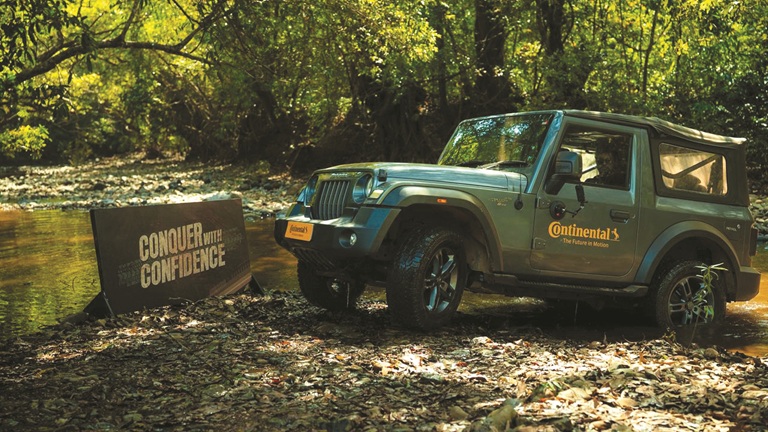
The recent launch of the CrossContact A/T² in India reflects this strategy. Introduced during Continental’s Track Day at Dot Goa 4x4, the product positions India among the early global markets for the tyre. “The first thing you notice is noise – or the lack of it,” Gupta says. “You hear the air-conditioning, not the tyre.” Ride comfort, grip and consistency across terrains define its appeal. As Gupta puts it, “Jahan tak soch jaati hai, wahan tak yeh tyre kaam karta hai.”
Looking ahead, Continental remains largely insulated from shifts in original equipment strategies, such as the gradual removal of spare tyres. Improved carcass design and stronger sidewalls are reducing puncture risk, but the company’s primary focus remains the replacement market.
For Gupta, the question is no longer whether India is ready for premium tyres, but how effectively manufacturers execute. “The market is finally ready for premium tyres,” he concludes. With passenger vehicle sales at record levels, SUVs firmly dominant and premium consumption expanding, Continental believes it is well positioned to grow alongside India’s evolving mobility landscape.
Falken Tyre Europe GmbH Rebrands As DUNLOP Tyre Europe GmbH
- By TT News
- February 26, 2026

Falken Tyre Europe GmbH has officially transitioned to operating under the name DUNLOP Tyre Europe GmbH, following its formal registration with the Offenbach Local Court. This change signifies a pivotal development for the Sumitomo Rubber Industries subsidiary. The rebranding represents a calculated and essential move to establish a more formidable European footprint for the DUNLOP brand. Company leadership acknowledges that this evolution is built upon the considerable equity established by Falken, including its strong market recognition, unwavering product quality and the commitment of its personnel.
This strategic shift positions the organisation under the umbrella of a globally respected marque, with its future strategy firmly centred on expansion, pioneering advancements and ecological responsibility. A prominent symbol of this new chapter will be unveiled shortly, with the renaming of the DUNLOP City Tower in Offenbach. A formal ceremony will mark the occasion, featuring the presentation of the DUNLOP logo at the tower. The event is set to be attended by Offenbach's Lord Mayor, Dr Felix Schwenke, alongside the company’s managing directors, Hiroshi Hamada and Markus Bögner, and the newly enlarged DUNLOP team.
Markus Bögner, Managing Director and President, DUNLOP Tyre Europe GmbH, said, “The name change is an important milestone of which we can be very proud. It strengthens our identity and underlines that we are ready for the next steps. Our strong heritage with Falken is and remains part of our success, laying the foundations for DUNLOP’s future in Europe. Our thanks go to all our employees and partners who have supported and accompanied us on this journey.”







Comments (0)
ADD COMMENT